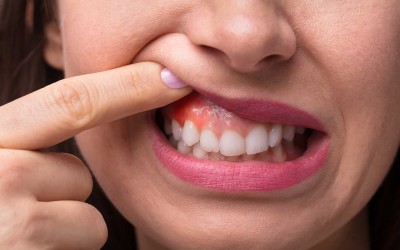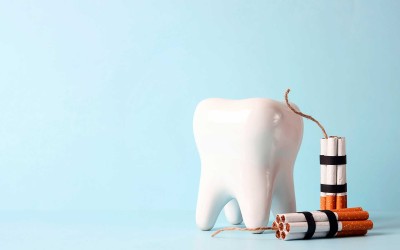Effects of Stress on Dental Health and How To Cope With It

Effects of Stress on Dental Health and How To Cope With It
- 29 February 2024
- 8695 views
Learn about the effects of stress on dental health! Take preventive measures against dental problems for healthy smiles.
This content is for informational purposes only and does not replace medical advice, diagnosis, or treatment. Please consult a healthcare professional for any health concerns.
Table of Contents
Today's fast-paced lifestyle and efforts to manage various responsibilities often lead many individuals to experience stress in their daily lives. However, the impact of stress is not limited to mental health; it can also significantly affect dental health. So, what are these effects, and how can they be managed?
Dental Health Problems Caused by Stress
While stress intensely affects an individual mentally, it also manifests physical symptoms, with dental health problems being among the notable ones.
The dental health problems that stress can cause include:
- Bruxism (Teeth Grinding): Stress can unconsciously lead many people to clench or grind their teeth during the night, a condition known as bruxism. This can result in long-term damage to the teeth, causing wear, cracks, and even jaw problems. It may also lead to waking up with jaw and head pain, affecting overall comfort.
- Gum Diseases: Stress can weaken the immune system and reduce resistance to oral bacteria. This weakened immune response can increase the risk of developing gum diseases. Gum inflammation and other periodontal issues may arise in connection with stress.
- Mouth Ulcers and Aphtha: Stress can trigger the formation of aphtha or ulcers in the mouth, resulting in painful lesions and discomfort.
- Temporomandibular Joint (TMJ) Disorders: Stress tends to cause clenching of the jaw muscles or a sensation of tension. This condition can lead to temporomandibular joint (TMJ) problems, manifesting as jaw pain, difficulty chewing, and jaw joint clicking.
- Dry Mouth: Stress can lead to a reduction in saliva production in the body. Insufficient saliva can increase bacterial growth in the mouth and the risk of cavities.
- Tooth Decay and Neglect of Oral Health: Individuals under stress often tend to adopt unhealthy eating habits and may neglect proper oral care. This behavior increases the risk of tooth decay and other oral health issues.
Coping with Stress and Protecting Dental Health
To reduce the effects of stress on dental health, integrating stress management strategies into your life and maintaining regular oral care is crucial. Remember that a healthy lifestyle not only contributes to your physical well-being but also positively impacts your dental health. Therefore, applying stress-coping methods can enhance your overall quality of life along with your oral health.
Here are some recommendations for coping with stress and preserving dental health:
- Relaxation Techniques: Incorporate stress-reducing techniques such as yoga, meditation, or deep breathing into your daily routine to support your dental health.
- Participation in Stress Management Programs: Joining stress management programs can enhance your stress-coping skills and positively influence your long-term oral health.
- Attention to Oral Hygiene: Maintaining oral hygiene by regular brushing, flossing, and keeping dental check-up appointments is crucial.
- Night Guard Usage: If you experience teeth grinding, consider using a night guard after consulting with your dentist.
- Regular Exercise: Physical activity can reduce stress levels and support your overall health.
- Healthy Eating Habits: A balanced diet not only benefits your general health but also contributes to positive dental health.
Keep in mind that the stress-coping process is personal and may vary for everyone. Finding strategies that work best for you and consistently incorporating them into your routine is a significant step toward supporting your dental and overall health. If you have any concerns about dental health problems or are coping with stress, seeking support from a healthcare professional or dentist is important.







